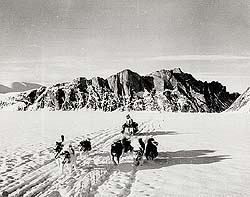 |

 
 |
 |
CONCLUSION
Mail carriers and their dog-teams were crucial to the transportation of the mail in the Yukon during a critical period in the region's modern historical development. The establishment of a mail service, along with the gold rush economy, helped to open the doors of this northern territory to the "blessings" of modern civilization.
The cost of the mail service in the Yukon was enormous: the remoteness of the area meant that much of the equipment and manpower needed to maintain the service had to be imported. In 1898, the estimated cost of fortnightly winter service for letter mail alone, from Victoria, British Columbia to Dawson, Yukon was $79,000.69 A total of 22 men (mushers) and 125 dogs were called into service at the time.70 This was a small number, compared to the larger migration of men and dogs to the North during the Klondike boom, which numbered in the tens of thousands. These early mushers and their dogs, however, helped to establish a vital connection between a world hungry for news from the Klondike and the territory's new inhabitants – who were equally eager to spread the word about the search for gold and the realities of life in the North.
 |

Dog-Team Mail Service, ca. 1920
© Public domain
National Library and National Archives
of Canada, PA-061710
This team is using a trail already taken by others and following tracks left in the snow. |
The life of a mail carrier, a hundred years ago, was not easy. While many perished during the course of duty, others live on in the popular imagination through the efforts of countless poets, novelists and historians. These writers preserve for us the vivid image of the "sturdy, dusky courier fighting his terrible way over leagues and leagues of ice and snow, forest, mountain and plain, the picturesque Guardians of the North, with their racing teams of spirited dogs."71
Robert Service may well have been thinking of the mushers in writing of the formidable challenges that faced the men who dared test the iron law of the Yukon:
| |
Staggering blind through the storm-whirl, stumbling mad through the
snow,
Frozen stiff in the ice-pack, brittle
and bent like a bow;
Featureless, formless, forsaken, scented by wolves in their flight,
Left for the wind to make music through ribs that are glittering
white . . .
Robert Service (1874–1958)72
|

|
 |